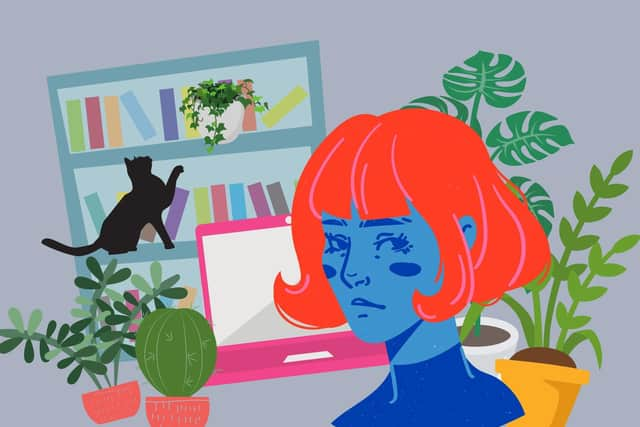What is the impact of working from home on our mental health?
This article contains affiliate links. We may earn a small commission on items purchased through this article, but that does not affect our editorial judgement.
It’s been a year of seismic changes and the ripping up of traditions that had once seemed unshakeable.
One tidal shift has been the move from offices to working from home (WFH).
Advertisement
Hide AdAdvertisement
Hide AdThere are of course those incredible essential workers who have had no choice but to continue working in public during the pandemic.
But, for those people who have had to work where they live, their worlds have shrunk.
People have taken on DIY projects, stockpiled houseplants, or even bought new pets, to vary the mundanity of staring at the same four walls day after day.
Zoom backgrounds have become a more important statement of identity than practically anything else. The monotonous daily walk to get some ‘fresh air’ and ‘feel alive’ feels like hopping on a hamster wheel.
Meanwhile, days of the week have become only distinguishable by what TV show is on that night (Sunday is now Line of Duty Day, of course).


It started as a temporary measure, but a year of WFH is a reality for many and offices aren’t opening any time soon.
So, what is the psychological impact of working, living, and socialising all in one space?
We spoke to Dr Chris Pell, who is chair of the general adult faculty at the Royal College of Psychiatrists in Scotland.
Advertisement
Hide AdAdvertisement
Hide Ad"It’s been a big shift for people,” he says, “There has been some advantages to it – saving money from the commute, being more productive – but a lot of people have really struggled with it.


"Being cut off from colleagues, juggling demands of the lockdown, if you have kids at home. It’s left a lot of people feeling stressed and lonely.
"The lockdowns are necessary to protect people’s lives and stop the NHS being overwhelmed. Having Covid can really affect your mental health as well.
"There’s a bit of a balance to be struck. I think most people want to keep working from home to some degree after the pandemic.”
In Scotland, before the pandemic just eight per cent of the workforce were WFH full time. With lockdown that has risen to 52 per cent of all employees.
‘You wouldn’t sit in a meeting and look in a mirror’
A key part of WFH life is video calls. The meeting that should have been an email has evolved to its final digital form.
But the psychological implications of these now everyday occurrences are complicated. Dr Pell says: “I think all the video calls are a lot more demanding on our brains.
"Things like people’s body language – you can’t see most people from the shoulders down so you don’t see all the gestures they are using.
Advertisement
Hide AdAdvertisement
Hide Ad"Often the resolution isn’t good enough to see people’s micro-expressions. What people are thinking, their emotions. It’s a lot harder to judge whether what we are saying is landing.”
Hearing everything through speakers also skews the timing, the tone and the pitch of voices, says Dr Pell. Then there’s all the other factors like being told you’re on mute 50 times.
Another unnatural thing about video calls? "They put us in much closer proximity we wouldn’t normally stare into each other’s faces. A lot of people find that uncomfortable, people are invading our personal space.
"They enable us to see ourselves constantly. We wouldn’t sit in a meeting and look in a mirror.
"It can emphasise the feeling of being watched. It makes you more aware of how others see you and we are not used to that constant visual feedback of ourselves. Now we have got additional pressure.”
Blurring of home and work boundaries
Common advice given to those working from home is to use a separate room – like a spare bedroom or study – to work in. But what happens if you don’t have that luxury?
A survey by the Royal Society for Public Health (RSPH) found more than a quarter of people did not have a separate area to work from in their home. Instead, they had to work from their sofa or bedroom.
This, the survey found, led to musculoskeletal problems – but also led to people feeling lonely and isolated.
Advertisement
Hide AdAdvertisement
Hide Ad"It affects those who are less well off more,” says Dr Pell. Those living with multiple housemates were more likely to think that working from home was worse for their health and wellbeing, according to the RSPH poll.
Dr Pell says: "You roll out of bed, fire up the laptop and you are at work. Normally you would have that time getting dressed, going on the bus.
"Then when you’re going home clocking off. Having some time to process what you have done before winding down and trying to switch off."
The more working people in the household, the more difficult it is to switch off, he says, as others may have different work times.
"It’s a lot more tempting to check your emails as you are going off to bed. It all starts to merge and you don’t have that separation.
"I think it will mean people are more immersed and the pressures they have are emphasised.
"If you can’t switch off your sleep’s going to be affected. Then you can’t concentrate as well and it just makes things a hundred times harder.”
Home invasion
For professions like customer service and health care workers, working from home has been a challenge.
Advertisement
Hide AdAdvertisement
Hide Ad"It’s the invasion of privacy into their own home,” says Dr Pell, “If you get an angry and abusive customer, if you’re in an office you can put the phone down and have a moan with your colleagues.”
Emotive topics like speaking to someone about their experience with domestic violence can start to “invade and contaminate your living space,” says Dr Pell.
"That lack of separation can leave people feeling ‘I don’t want those memories in my house’”.
What can be done?
Trying to stick to pre-Covid routines is Dr Pell’s advice.
Stick to a sleep routine with a regular bedtime and a regular getting up time that you had pre-pandemic.
The doctor says: "Get washed, get dressed, have a good breakfast as if you were going to work at the same time. You can use your commute to do something you enjoy.”
For those who don’t have a spare room or study to work in, it’s still advised to stay away from the sofa if possible.
Dr Pell says: "I have seen suggestions to zone off a corner of the room so you aren’t looking at your work belongings. You’re creating a little hideaway.”
Clocking in and clocking off when you normally would have are also important. Organising your day and ticking off tasks also help keep your mind focused and not so overwhelmed.
Advertisement
Hide AdAdvertisement
Hide Ad"Keeping moving is a good trick,” says Dr Pell, “Do some stretches will help physical problems as well as reduce stress.
"Make sure you switch off. Try to get away from screens at the end of the day. Everyone turns off the work stuff then goes on social media.
"It’s best to get away from that. The bright light [of a mobile phone] stops you getting to sleep and stops you switching off.”
But finally, his advice is: it is okay not to be okay.
"People have found it extremely difficult over the last year and there’s lots of help out there. There’s always somebody.”
The fourth wave of this crisis is likely to be the mental health impact as the economic impact starts to bite. This is something mental health organisations are already thinking about and preparing for.
Dr Pell says: "I think we are all wondering how do we accommodate the demand we are expecting. Though a lot of the support people are going to need is social and financial.
"I think there’s a shift now, people recognise mental health needs to have a priority.”
- Mind has created a working from home wellness plan
- SAMH has a guide for mental health at work
- Samaritans is available 24 hours a day on 116 123 for free.
A message from the Editor:
Advertisement
Hide AdAdvertisement
Hide AdThank you for reading this article. We're more reliant on your support than ever as the shift in consumer habits brought about by coronavirus impacts our advertisers.
If you haven't already, please consider supporting our trusted, fact-checked journalism by taking out a digital subscription.
Comments
Want to join the conversation? Please or to comment on this article.